SSDI Arthritis: Does Arthritis Qualify for Disability Benefits?
- Last Updated: January 15th, 2026

Attorney Jessica Paluch-Hoerman, founder of TruLaw, has over 28 years of experience as a personal injury and mass tort attorney, and previously worked as an international tax attorney at Deloitte. Jessie collaborates with attorneys nationwide — enabling her to share reliable, up-to-date legal information with our readers.
Legally Reviewed
This article has been written and reviewed for legal accuracy and clarity by the team of writers and legal experts at TruLaw and is as accurate as possible. This content should not be taken as legal advice from an attorney. If you would like to learn more about our owner and experienced injury lawyer, Jessie Paluch, you can do so here.
Fact-Checked
TruLaw does everything possible to make sure the information in this article is up to date and accurate. If you need specific legal advice about your case, contact us by using the chat on the bottom of this page. This article should not be taken as advice from an attorney.
Key takeaways:
- Arthritis can qualify for SSDI if it's severe enough to stop you from working for a year or more.
- Different types of arthritis, such as osteoarthritis and rheumatoid arthritis, might be considered disabilities by the SSA.
- Talking with a Social Security attorney can help make sure you have all the right information for your disability claim.
Overview Of SSDI Arthritis Benefits
Question: Can I qualify for SSDI arthritis benefits?
Answer: Yes, you may qualify for SSDI arthritis benefits if your inflammatory arthritis affects your axial spine (such as psoriatic arthritis) or your peripheral joints (rheumatoid arthritis and psoriatic arthritis), and you can demonstrate to the Social Security Administration (SSA) that you’re unable to work as a result.
On this page, we’ll discuss this question in further depth, an overview of SSDI arthritis benefits, eligibility criteria to file for SSDI arthritis benefits, and much more.
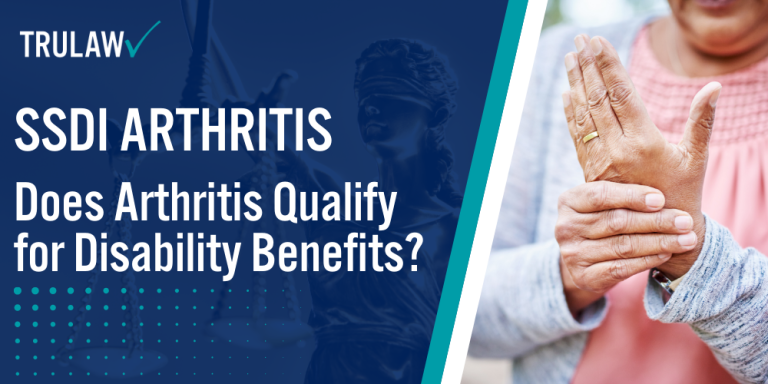
SSDI Arthritis Disorders: Evaluation Process
To qualify for SSDI arthritis benefits, you must meet the following criteria:
- You cannot currently be working full-time.
- If you are 31 or older, you generally must have worked five of the previous 10 years.
- The arthritis must cause swelling, pain, and limit joint movement.
- You will need to provide proof of your disability through medical records and evaluations.
- If your application is denied, you may need to go through an appeals process, possibly with the help of a lawyer or advocate.
If you or a loved one are filing an SSDI application or appeal, contact TruLaw today using the chat on this page to receive an instant case evaluation.
Discover how the SSDI Lawyers within TruLaw’s legal network can help you today.
Table of Contents
Does Arthritis Qualify for Disability Benefits?
Arthritis is a common health problem where joints swell, hurt, and can be hard to move.
About 1 in 4 adults in the U.S. have some form of this condition.
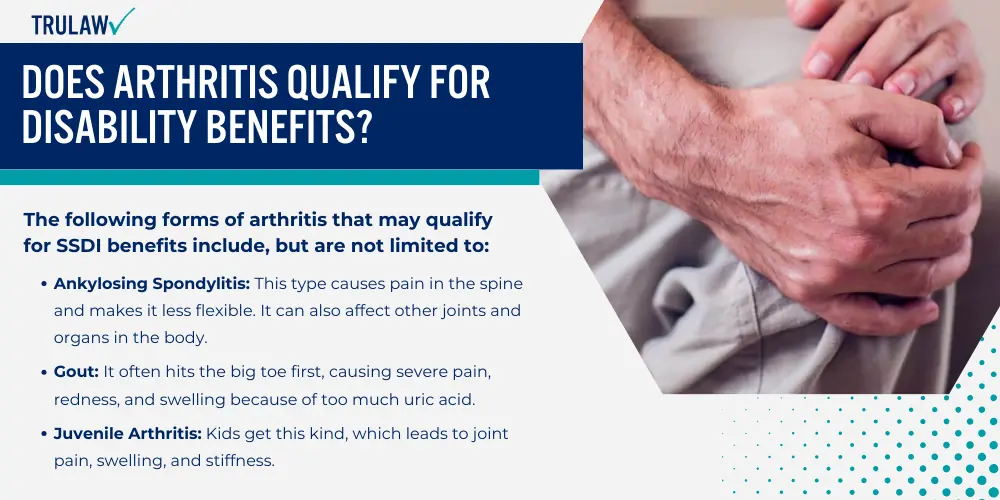
Social Security Administration: SSDI Arthritis
Arthritis can make work hard or impossible. The Social Security Administration (SSA) knows this.
They see arthritis as a disability if it stops you from working for at least one year or it could cause death.
There are many kinds of arthritis, and some hit you so badly that they match the SSA’s list of disabilities.
For SSDI benefits to kick in, your doctor must say you have arthritis, and it stops you from working like before.
The SSA considers the severity of your pain, the distance you can move, and whether tools like walkers help you get around.
They also want to know about surgeries and treatments tried but didn’t fix things.
Evidence is key – stuff like medical records that show how much arthritis changes what you do each day.
Qualifying Types of Arthritis for SSDI Benefits
Arthritis is a disease that causes pain and swelling in the joints.
Some forms of arthritis can be so bad that they make it hard for people to work and do everyday things.
The following forms of arthritis that may qualify for SSDI benefits include, but are not limited to:
- Ankylosing Spondylitis: This type causes pain in the spine and makes it less flexible. It can also affect other joints and organs in the body.
- Gout: It often hits the big toe first, causing severe pain, redness, and swelling because of too much uric acid.
- Juvenile Arthritis: Kids get this kind, which leads to joint pain, swelling, and stiffness.
- Osteoarthritis: The most common kind among adults, it wears away the cushion between bones, usually at the hips and knees.
- Pseudogout (CPPD): With this illness, calcium crystals gather in the joints, leading to sharp joint pain and swelling.
- Psoriatic Arthritis: People with psoriasis can develop this form, in which their skin gets scaly patches and their joints swell.
- Reactive Arthritis: occurs after an infection in another part of the body; it causes inflammation in the joints, eyes, or urinary tract.
- Rheumatoid Arthritis: An immune system disorder that attacks your own body tissues, including joints, leading to damage over time.
The Qualification Process for SSDI with Arthritis
Understanding the qualification process for SSDI with arthritis is crucial—criteria extend beyond diagnosis to how significantly your condition impacts daily functions and work capability.
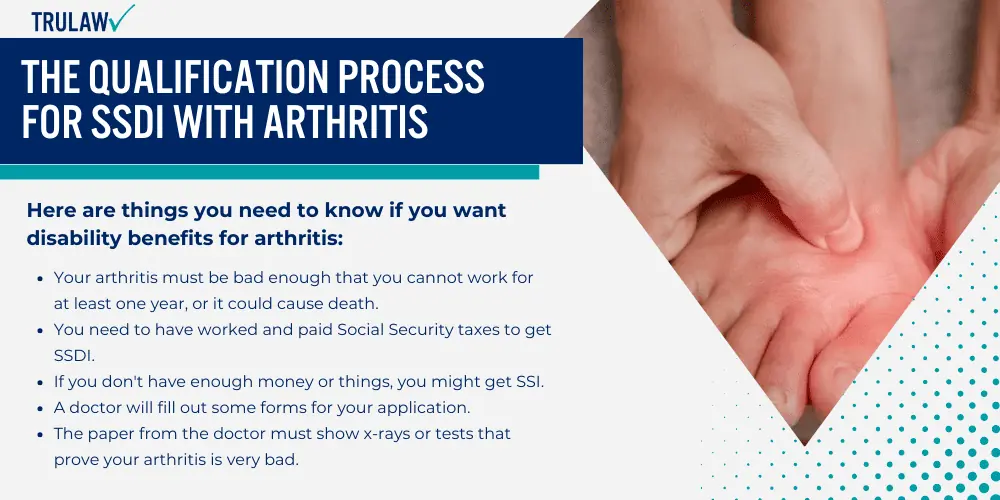
Requirements for qualification
Arthritis can make life hard.
You may not be able to work like before.
Here are things you need to know if you want disability benefits for arthritis:
- Your arthritis must be bad enough that you cannot work for at least one year, or it could cause death.
- Doctors should say your arthritis meets the SSA’s rules, especially listing 14.09 for inflammatory arthritis.
- You need to have worked and paid Social Security taxes to get SSDI. How long you worked gives you work credits.
- If you don’t have enough money or things, you might get SSI.
- A doctor will fill out some forms for your application.
- The paper from the doctor must show x-rays or tests that prove your arthritis is very bad.
- The doctor’s notes should also talk about how your life and work are harder because of the arthritis.
- For SSI, they look at how much money you make and what you own.
Process of applying for SSDI benefits with arthritis
Applying for SSDI benefits when you have arthritis can be a big step.
Here’s how to start and what you need to do:
- Learn about SSDI and arthritis on the Social Security Administration (SSA) website.
- Make sure your arthritis is one of the types that qualify for disability benefits.
- Start your application online at the SSA website or call their phone number to apply.
- Gather all your medical records, including doctor’s notes, test results, and treatment details.
- Fill out the application forms with accurate information about your health and work history.
- Include strong medical evidence like blood tests and imaging results that show your arthritis severity.
- Ask your healthcare providers to help with parts of your application that need their input.
- Describe how arthritis affects your daily life—like walking, sitting, or using your hands.
- Explain any side effects from medications that make it hard for you to work.
- Send in your complete application and wait for the SSA to review it.
- Provide additional information quickly if the SSA asks for more details.
- Review the reasons for denial carefully—it will guide you on what to fix for an appeal.
- File an appeal within 60 days if you think SSA made a mistake or missed important information.
Areas of the Body where Arthritis can lead to Disability
Arthritis can impact various body parts with enough severity to qualify as a disability, and exploring these areas reveals the profound effect this condition can have on daily activities and work capability.
Arthritis in Feet
Arthritis in the feet can make it hard to walk and do day-to-day things.
This condition often causes pain, swelling, and stiffness in the foot joints.
Sometimes, surgery is needed to help those suffering from severe foot arthritis.
Doctors look at how bad the arthritis is and how long you’ve had it when they decide if you can get disability benefits.
For people with arthritis in their feet applying for SSDI, medical proof of your condition is key.
Your healthcare provider might need to show how much this illness has limited your ability to move around.
They may also have records of any foot operations done because of your arthritis.
These details help show that your feet’s arthritis stops you from working and doing normal activities, which could support your claim for Social Security disability benefits.
Arthritis in Hands
Arthritis in your hands can make everyday tasks tough.
You may find it hard to hold things, turn keys or do your job.
If hand arthritis is bad enough, you might not be able to work like before.
Sometimes a boss has to change things around so you can keep working.
The law says they should do this.
Severe hand arthritis could mean you get disability benefits.
There are different kinds of arthritis that affect the hands.
Your doctor will check how bad your arthritis is and if it’s the kind that qualifies for help.
They look at things like pain, stiffness, and how well your joints move.
Arthritis in Hips
Arthritis in the hips can make walking, sitting, and even lying down painful.
The hip joint carries the body’s weight and allows for a wide range of motion, but arthritis can damage this essential joint.
Types like osteoarthritis cause the cartilage to wear away, leading to pain and stiffness.
Hip arthritis might mean you need help from a cane or walker to get around.
Some people have such bad pain that they cannot work anymore.
If your hip arthritis stops you from working, Social Security Disability Insurance (SSDI) may be available to help.
They will examine how bad your arthritis is and whether it affects your ability to do daily tasks or work jobs that require standing or moving about.
SSDI also checks whether other medical treatments have worked for you, or if surgery helped lessen the pain and improve your mobility.
Medical Evidence to Support Your Claim
Securing disability benefits for arthritis hinges on presenting conclusive medical evidence — the cornerstone of a successful SSDI claim.
To illustrate this point, individuals must gather comprehensive documentation that aligns with SSA criteria, showcasing the extent of their joint impairment and its impact on daily functions.
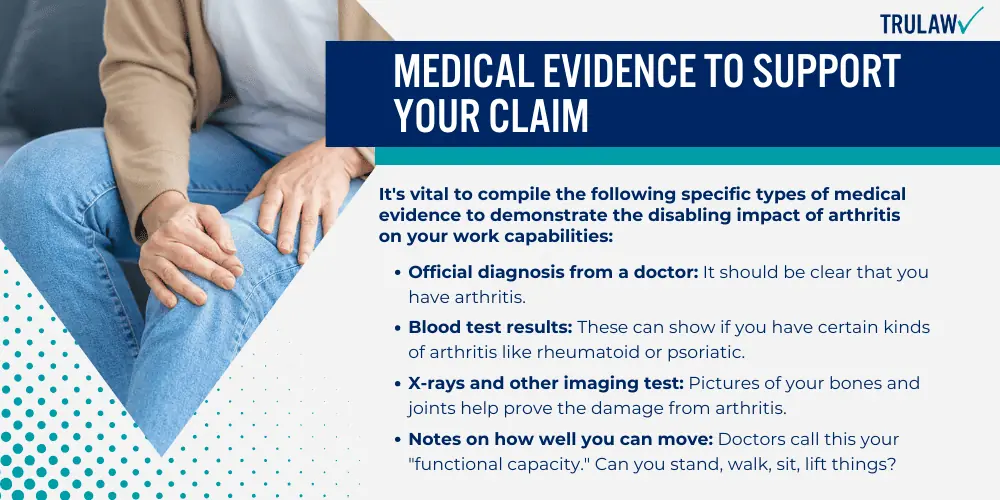
Importance of medical documentation
Having the right medical documents is key to a disability claim for SSDI arthritis.
These papers show how bad your arthritis is and how it stops you from working.
Side effects from medication are also important to note.
Your doctors play a big part in getting these papers ready.
They write down details about your health problems and fill out parts of the SSDI forms.
This info helps those who decide if you can get benefits understand your situation better.
Good records make it easier for them to see why you need help because of your arthritis.
What type of medical evidence is required
Proving arthritis is a disability for SSDI needs strong medical evidence.
You must show how your arthritis stops you from working.
It’s vital to compile the following specific types of medical evidence to demonstrate the disabling impact of arthritis on your work capabilities:
- Official diagnosis from a doctor. It should be clear that you have arthritis.
- Blood test results. These can show if you have certain kinds of arthritis like rheumatoid or psoriatic.
- X-rays and other imaging tests. Pictures of your bones and joints help prove the damage from arthritis.
- Notes on how well you can move. Doctors call this your “functional capacity.” Can you stand, walk, sit, lift things?
- Records of treatments tried. This could be medicines, physical therapy, or surgeries. They show what didn’t work to help your pain or movement.
- Statements about side effects of medications. Some drugs for arthritis can make it hard to do everyday tasks because they make you tired or dizzy.
- Letters from doctors who treat your arthritis regularly. They know best about how it limits what you can do at work and at home.
- Details of any devices used to help move around. Maybe you need special shoes, braces, or a cane to walk because of joint pain in your legs or feet.
Medical-Vocational Allowances in Arthritis Cases
In cases of arthritis where the extent of disability is not clear-cut through medical criteria alone, a Medical-Vocational Allowance comes into play.
This assessment considers a person’s age, education, work history, and residual functional capacity to determine eligibility for SSDI benefits.
Medical-Vocational Allowance
A medical-vocational allowance can be a key factor for those with severe arthritis seeking SSDI.
This type of allowance considers your age, education, work experience, and the level of physical or mental work you can do with your arthritis.
It helps to show that even if your condition doesn’t meet set disability listings, you’re still unable to perform any job because of your limitations.
If arthritis stops you from doing any kind of substantial gainful activity, this allowance might apply in your case.
The Social Security Administration uses it to decide if you qualify for benefits.
A good disability attorney knows how important this is for winning a claim and will gather all the evidence needed to support it.
How it applies to arthritis cases
Arthritis can make your life tough.
You may not be able to do your job or take care of yourself like before.
The Social Security Administration knows this and might help you get benefits.
They use a medical-vocational allowance, which helps determine whether you really cannot work because of your arthritis.
The medical-vocational allowance looks at many things.
It checks your ability to move, the kind of work you did before, and your age.
All this helps them decide if arthritis stops them from working and gives them money to help with bills and living costs if they see that it does.
Steps to Take To Qualify for Disability with Arthritis
Preparing for SSDI application due to arthritis involves a thorough gathering of all pertinent medical details and evidence.
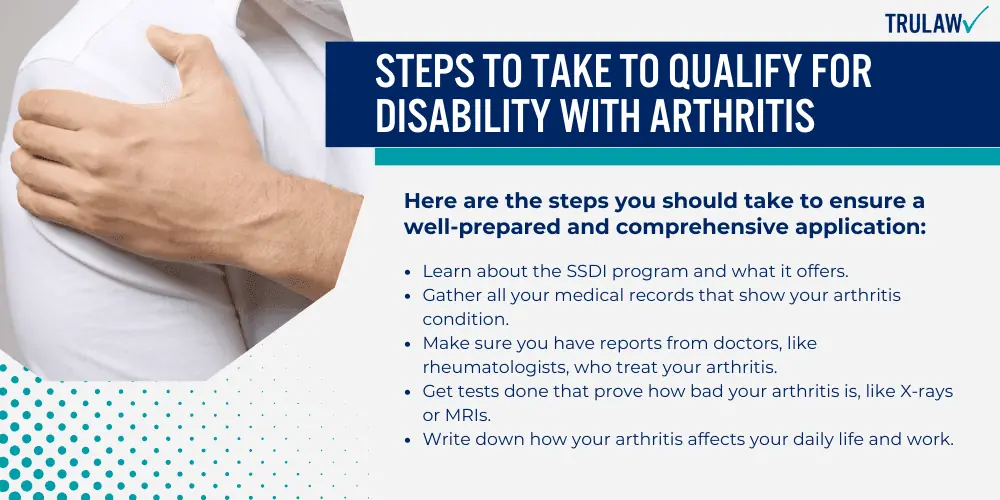
Seeking guidance from an experienced Social Security Attorney, such as those at the TruLaw, can significantly bolster the strength of your claim.
Preparing for the application process
Getting ready to apply for SSDI with arthritis can seem like a big task.
It’s important to have everything in order before you start.
Here are the steps you should take to ensure a well-prepared and comprehensive application:
- Learn about the SSDI program and what it offers.
- Check if your arthritis meets the Blue Book listing 14.09 for inflammatory arthritis.
- Gather all your medical records that show your arthritis condition.
- Make sure you have reports from doctors, like rheumatologists, who treat your arthritis.
- Get tests done that prove how bad your arthritis is, like X-rays or MRIs.
- Write down how your arthritis affects your daily life and work.
- List any other health problems you have along with arthritis.
- Fill out the SSDI application form on the SSA website or call their phone number to start the process.
- Ask your healthcare providers to help with parts of the application that need medical details.
- Collect evidence of any assistive devices you use because of arthritis, like canes or braces.
Importance of consulting with a Social Security Attorney
Talking to a Social Security attorney can be a smart move if you have arthritis and want disability benefits.
These lawyers know the ins and outs of social security benefits.
They help you fill out forms correctly, gather all your medical history, and ensure that nothing important is left out of your application for disability for arthritis.
A good lawyer will support you at every step, from sending in your initial claims to talking before an administrative law judge if necessary.
A lawyer who knows about SSDI can fight hard for your case.
They use their knowledge of immune system disorders, joint dysfunction, and other evidence to prove that arthritis prevents one from working as before.
With their help, you might see better results than going it alone—getting through the process faster with less stress.
Disability Benefits for Specific Types of Arthritis
Certain arthritis diagnoses can impact eligibility differently under SSDI guidelines—highlighting Psoriatic Arthritis and Osteoarthritis, we’ll uncover the specifics that set them apart when seeking disability benefits.
Psoriatic Arthritis
Psoriatic Arthritis can be tough on your body and work life.
It makes joints swollen, stiff, and painful.
Skin gets itchy patches, too.
If Psoriatic Arthritis stops you from working, you may qualify for Social Security disability benefits.
The law considers how bad your arthritis is, what treatment you’ve tried, whether the medicine helps and whether you can still do any job.
Your doctor’s notes are key to showing that your arthritis is severe enough for benefits.
To prove that inflammation or autoimmune disease markers are present, you’ll need blood test results and images of affected joints, such as knees or hands.
Social Security checks all this info along with your age and past jobs to decide if you qualify for help.
If Psoriatic Arthritis keeps making it hard for you to work every day or focus well on tasks, let them know.
Tell them about the sick days because of joint pain or falling over when the balance gets tricky.
All these things support why arthritis should count as a disability for SSDI benefits.
Osteoarthritis
Osteoarthritis is a joint disease where the cushioning cartilage wears down, causing bones to rub together.
This can lead to pain, stiffness, and sometimes swelling in the joints.
It’s very common; about 1 in 4 adults in the U.S. has it.
The knees, hips, lower back, neck, small joints of the fingers and the bases of the thumb and big toe are often affected.
For some people with osteoarthritis, everyday tasks become hard to do because their joints hurt or don’t move right.
They might struggle with walking or climbing stairs.
If osteoarthritis stops someone from working for at least 12 months or more due to its severe effects on movement—like problems with fine and gross movements—or it causes major dysfunction of a joint through joint damage confirmed by appropriate medically acceptable imaging—it could qualify as a disability for Social Security benefits.
Getting these benefits depends on how bad your symptoms are and how much they stop you from doing your job or living normally.
You can apply for disability benefits online if osteoarthritis makes it too tough to work.
The Chances of Getting Disability for Arthritis
Securing disability benefits for arthritis hinges on demonstrating its impact on your ability to work — not all cases are guaranteed approval.
Factors including the severity of symptoms, adherence to prescribed treatment, and thoroughness of medical documentation play crucial roles in influencing the outcome.
The journey toward obtaining SSDI for arthritis may be arduous; however, detailed preparations and proper evidence can significantly enhance your prospects.
Factors that affect approval
Many things can change whether you get disability for arthritis.
The Social Security Administration considers how bad your arthritis is, whether it stops you from working, and whether it will last a long time or lead to death.
They want to know about surgeries you had and how treatments work for you.
Your chances go up when doctors show how much arthritis changes your life.
If they say you need help walking or can’t use your hands well, this matters a lot.
It’s also important to tell them about all the ways arthritis makes daily tasks hard for you—like dressing, eating, or getting around the house.
Using clear records from your doctor that explain these things can really help your case.
The importance of persistence and accurate documentation.
Getting disability benefits for arthritis is not easy.
You must show the Social Security Administration (SSA) that your arthritis is very bad and makes it hard to work.
This means having strong proof.
Good records of your health problems are key.
Doctors’ reports, test results, and lists of medicines all help tell about your condition.
If you don’t give enough information or make mistakes in your paperwork, SSA might say no.
You have to stick with it too.
Sometimes SSA does not agree at first that you’re unable to work because of your arthritis.
You may need to ask more than once or go in front of a judge to explain how your illness affects you every day.
People who stay patient and keep their documents right often do better when asking for benefits again.
TruLaw #1 SSDI Arthritis Lawyer
Our extensive legal network understands the challenges you face and has the knowledge needed to guide you through the SSDI application process.
Reasons to choose TruLaw, a personal injury firm experienced in handling SSDI arthritis claims:
- Specialization in Arthritis Claims: Our focus on arthritis-related issues ensures your case is handled with the necessary expertise and compassion.
- Personalized Service: We recognize the unique nature of your situation and are dedicated to providing the tailored attention your case requires.
- Proven Success: With years of experience, we have a history of successful claims, showcasing our ability to effectively advocate for and secure your benefits.
- No Upfront Costs: Committed to providing accessible legal assistance, we offer our services on a contingency basis—meaning you only pay if we win on your behalf.
- Clear Communication: Keeping you informed throughout the process is important to us. Contact TruLaw today via the chat on this page for an instant case evaluation.
If you or someone you know is preparing an SSDI application or appeal due to arthritis, reach out to TruLaw promptly using the chat on this page for a quick case assessment.
Discover how the SSDI Lawyers in TruLaw’s legal network can assist you with SSDI arthritis benefits.
Social Security Disability Insurance Frequently Asked Questions
-
In SSDI arthritis litigation, medical treatment is pivotal.
It’s not only about the diagnosis but also about demonstrating ongoing and consistent treatment.
This includes regular check-ups, adherence to medication, and any other prescribed therapies.
Documenting this treatment is crucial to establish the impact of arthritis on daily functioning and work capability.
-
The condition of peripheral joints, such as hips, knees, or ankles, is a key factor in SSDI arthritis claims.
If arthritis severely affects these joints, limiting effective movement or causing major deformity, the claim can be significantly strengthened.
The assessment focuses on how the arthritis in these joints impairs your ability to perform work-related tasks.
-
Collecting comprehensive medical evidence is vital in SSDI arthritis cases.
This evidence includes detailed medical records, doctors’ notes, treatment history, and proof of ongoing medical issues.
It helps substantiate the severity of arthritis and its impact on daily life and workability, which is crucial for a successful SSDI claim.
-
Appropriate medically acceptable imaging, such as X-rays, MRIs, or CT scans, is crucial in SSDI arthritis litigation.
These imaging tests provide objective evidence of the physical condition of your joints and the extent of damage caused by arthritis.
They are essential in supporting your claim by showing the severity of your condition in a tangible, medically recognized way.

Managing Attorney & Owner
With over 25 years of legal experience, Jessica Paluch-Hoerman is an Illinois lawyer, a CPA, and a mother of three. She spent the first decade of her career working as an international tax attorney at Deloitte.
In 2009, Jessie co-founded her own law firm with her husband – which has scaled to over 30 employees since its conception.
In 2016, Jessie founded TruLaw, which allows her to collaborate with attorneys and legal experts across the United States on a daily basis. This hypervaluable network of experts is what enables her to share the most reliable, accurate, and up-to-date legal information with our readers!
Additional Social Security Disability Insurance resources on our website:
Here, at TruLaw, we’re committed to helping victims get the justice they deserve.
Alongside our partner law firms, we have successfully collected over $3 Billion in verdicts and settlements on behalf of injured individuals.
Would you like our help?
At TruLaw, we fiercely combat corporations that endanger individuals’ well-being. If you’ve suffered injuries and believe these well-funded entities should be held accountable, we’re here for you.
With TruLaw, you gain access to successful and seasoned lawyers who maximize your chances of success. Our lawyers invest in you—they do not receive a dime until your lawsuit reaches a successful resolution!
AFFF Lawsuit claims are being filed against manufacturers of aqueous film-forming foam (AFFF), commonly used in firefighting.
Claims allege that companies such as 3M, DuPont, and Tyco Fire Products failed to adequately warn users about the potential dangers of AFFF exposure — including increased risks of various cancers and diseases.
Depo Provera Lawsuit claims are being filed by individuals who allege they developed meningioma (a type of brain tumor) after receiving Depo-Provera birth control injections.
A 2024 study found that women using Depo-Provera for at least 1 year are five times more likely to develop meningioma brain tumors compared to those not using the drug.
Suboxone Tooth Decay Lawsuit claims are being filed against Indivior, the manufacturer of Suboxone, a medication used to treat opioid addiction.
Claims allege that Indivior failed to adequately warn users about the potential dangers of severe tooth decay and dental injuries associated with Suboxone’s sublingual film version.
Social Media Harm Lawsuits are being filed against social media companies for allegedly causing mental health issues in children and teens.
Claims allege that companies like Meta, Google, ByteDance, and Snap designed addictive platforms that led to anxiety, depression, and other mental health issues without adequately warning users or parents.
Transvaginal Mesh Lawsuits are being filed against manufacturers of transvaginal mesh products used to treat pelvic organ prolapse (POP) and stress urinary incontinence (SUI).
Claims allege that companies like Ethicon, C.R. Bard, and Boston Scientific failed to adequately warn about potential dangers — including erosion, pain, and infection.
Bair Hugger Warming Blanket Lawsuits involve claims against 3M — alleging their surgical warming blankets caused severe infections and complications (particularly in hip and knee replacement surgeries).
Plaintiffs claim 3M failed to warn about potential risks — despite knowing about increased risk of deep joint infections since 2011.
Baby Formula NEC Lawsuit claims are being filed against manufacturers of cow’s milk-based baby formula products.
Claims allege that companies like Abbott Laboratories (Similac) and Mead Johnson & Company (Enfamil) failed to warn about the increased risk of necrotizing enterocolitis (NEC) in premature infants.
Here, at TruLaw, we’re committed to helping victims get the justice they deserve.
Alongside our partner law firms, we have successfully collected over $3 Billion in verdicts and settlements on behalf of injured individuals.
Would you like our help?

